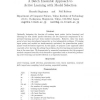874 search results - page 90 / 175 » Iterative Learning Control - Monotonicity and Optimization |
122
Voted
GECCO
2008
Springer
15 years 3 months ago
2008
Springer
For artificial entities to achieve high degrees of autonomy they will need to display appropriate adaptability. In this sense adaptability includes representational flexibility gu...
136
click to vote
SAB
2010
Springer
15 years 1 months ago
2010
Springer
Biological brains can adapt and learn from past experience. In neuroevolution, i.e. evolving artificial neural networks (ANNs), one way that agents controlled by ANNs can evolve t...
107
Voted
GECCO
2009
Springer
15 years 7 months ago
2009
Springer
Evolution of neural networks, as implemented in NEAT, has proven itself successful on a variety of low-level control problems such as pole balancing and vehicle control. Nonethele...
116
click to vote
NN
2008
Springer
15 years 2 months ago
2008
Springer
Optimally designing the location of training input points (active learning) and choosing the best model (model selection) are two important components of supervised learning and h...
129
click to vote
GECCO
2006
Springer
15 years 6 months ago
2006
Springer
This study aims to design a new co-evolution algorithm, Mixture Co-evolution which enables modeling of integration and composition of direct co-evolution and indirect coevolution....

